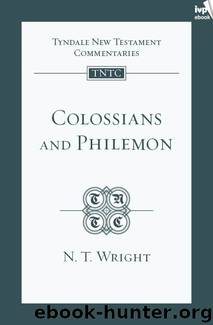Colossians & Philemon (TNTC) by N. T. Wright

Author:N. T. Wright [Wright, N. T.]
Language: eng
Format: epub
ISBN: 9780830821921
Barnesnoble:
Publisher: InterVarsity Press
Published: 2009-06-08T16:00:00+00:00
ii. Therefore, do not submit to Jewish regulations (2:16–23)
a. These things were mere preparations for Christ’s new age (2:16–19). As often with Paul, the most significant word is the connective—in this case the Therefore at the start of verse 16. Paul is drawing out the implications of the victory of Christ over the rulers and authorities. They had tried to disqualify Gentiles from membership in God’s people, holding up ‘the handwriting, with its regulations’ as a barrier against them. Now Paul warns the Colossians against letting any ordinary mortal do what the ‘powers’ have failed to do.
16–17. The first of the two negative commands of this section is do not let anyone judge you—perhaps better, with RSV, ‘pass judgment on you’. This is not so much a matter of someone criticizing them (J. B. Phillips), taking them to task (NEB) or deciding for them (JB). It is a matter of excluding them, or informing them that they are excluded, from the people of God, on the basis of the Law’s regulations which, according to verse 14, no longer stand in their way. This, broadly speaking, was what had happened (or was threatening to happen) to the Christians in Galatia (see Gal. 4:17). The phrase by what you eat or drink refers to the kosher laws of the Old Testament, extended, as they already were in Paul’s time, to include wine as well as food.34 Or with regard to a religious festival, a new moon celebration or a Sabbath day is a fairly typical list of Jewish holy days (e.g. Ezek. 45:17; Hos. 2:11), referring in descending order to the great annual festivals, the monthly celebrations and the weekly Sabbaths. These rules of diet and ritual marked out the Jew from his pagan neighbour. Failure to observe them implied that one did not belong to God’s people.
It is interesting to observe what Paul does not say in opposition. He never says, here or in Galatians, that Christianity has nothing to do with Judaism. That would have been an equally effective argument in urging the Colossians (or the Galatians) to have no truck with Jewish regulations; but it would have cut off the branch upon which his whole argument rests, namely, the belief that Christianity is the fulfilment of Judaism. Christians are members of the ‘age to come’ for which Israel had been waiting. But ‘when the perfect is come, the partial is abolished’ (1 Cor. 13:10): or, as he puts it here, these are a shadow of the things that were to come; the reality, however, is found in Christ.
This language of ‘shadow and substance’ could be used in Hellenistic Greek in a Platonic sense, contrasting the ‘shadowy’ world of material objects with the ‘real’ world of ‘forms’ or of spiritual realities. It is true that Paul appears to be drawing up a contrast here between outward material regulations and inward spiritual truths.35 But, just as he never says that Christianity has nothing to do with Judaism, so he never says that it has nothing to do with material things, even with outward forms of worship and ritual.
Download
This site does not store any files on its server. We only index and link to content provided by other sites. Please contact the content providers to delete copyright contents if any and email us, we'll remove relevant links or contents immediately.
| Guides | New Testament |
| Old Testament |
The Five People You Meet in Heaven by Mitch Albom(3569)
The Secret Power of Speaking God's Word by Joyce Meyer(3218)
Real Sex by Lauren F. Winner(3022)
Name Book, The: Over 10,000 Names--Their Meanings, Origins, and Spiritual Significance by Astoria Dorothy(2987)
The Holy Spirit by Billy Graham(2952)
0041152001443424520 .pdf by Unknown(2845)
How The Mind Works by Steven Pinker(2816)
ESV Study Bible by Crossway(2778)
Ancient Worlds by Michael Scott(2688)
Churchill by Paul Johnson(2584)
The Meaning of the Library by unknow(2571)
The ESV Study Bible by Crossway Bibles(2551)
The Gnostic Gospels by Pagels Elaine(2531)
MOSES THE EGYPTIAN by Jan Assmann(2417)
Jesus by Paul Johnson(2362)
City of Stairs by Robert Jackson Bennett(2354)
The Complete Dead Sea Scrolls in English (7th Edition) (Penguin Classics) by Geza Vermes(2283)
The Nativity by Geza Vermes(2230)
Ancient Near Eastern Thought and the Old Testament by John H. Walton(2226)
